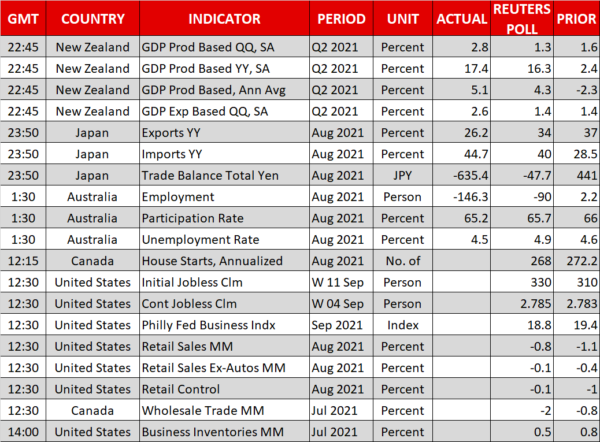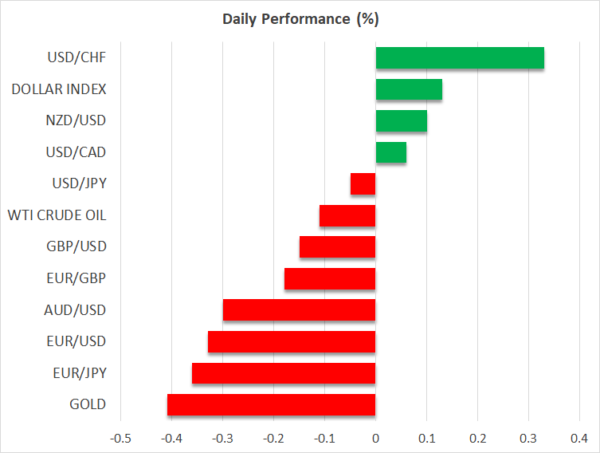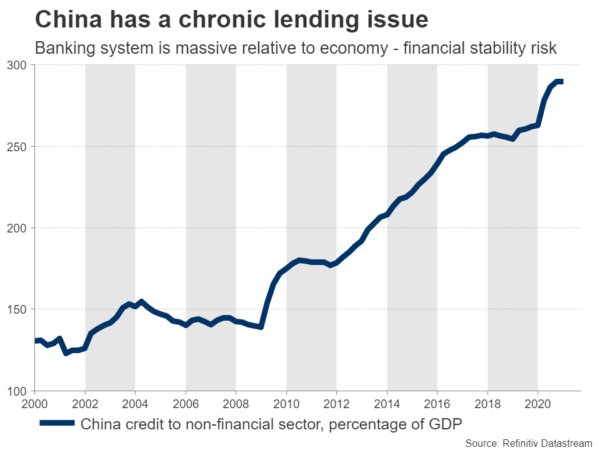- Chinese real estate titan heads for default – will it hit the economy?
- Wall Street stages solid comeback, oil keeps going
- US retail sales to inject some volatility into quiet FX market
Markets downplay China contagion
It’s time to talk about China. The situation is getting dicier as the nation’s second-largest property developer – Evergrande – is on the verge of default. Trading in the company’s onshore bonds was suspended today, which is usually a prelude to bankruptcy. Its total liabilities boil down to around $300bn, or 2% of China’s GDP.
Now that doesn’t sound dramatic, but it is when leverage comes into play. China’s real estate sector accounts for nearly one-third of the entire economy while the banking sector is currently almost three times as large as GDP, which means banks are levered up to the brim with private debt.
So you have a vulnerable system with tremendous private debt and banking leverage, and now a company that was flagged by the Chinese central bank back in 2018 as posing systematic risks to the entire economy is about to default. It’s easy to imagine a domino effect that ripples through markets as financial institutions that have exposure to Evergrande suffer serious damage.
Of course, Beijing won’t let that happen. The private sector might be drowning in debt but the government has plenty of dry powder and cards to play – it could stop any domino effect at its root by bailing out the most fragile players.
But when you combine the fragility in the Chinese system with signs that economic momentum is already crumbling and the regulatory crusade that Beijing has embarked on, it’s one risk too many. Policymakers might be able to stop a default cascade, but they can’t revive growth without making the nation’s leverage problem even worse.
This might be the most dangerous ‘grey swan’ risk for the global economy right now. The fallout has been contained to stock markets in China and Hong Kong so far, but if the situation deteriorates any further, the next levee to break might be China-sensitive currencies like the Australian and New Zealand dollars.
Wall Street bounces back, aussie strugglers
Over in America, Wall Street ended with broad gains on Wednesday, with the S&P 500 gaining nearly 0.9%. The 50-day moving average worked its magic once again, with the index recoiling higher after it tested that crucial indicator. There wasn’t much in terms of news to pin the move on.
President Biden met with Manchin and Sinema yesterday – the two most conservative Democrats in the Senate – in an attempt to secure their support for his transformative $3.5 trillion spending bill. He is clearly allocating most of his political capital to this spending package. This bill is a double-edged sword for the market as with great social spending also comes a greater tax burden, most notably on corporations and capital gains.
Elsewhere, oil prices remain in an upward trajectory, capitalizing on another drawdown in US inventories and the aftermath of the recent hurricanes, alongside hopes that surging electricity prices across the world will ultimately generate a shift towards crude.
US retail sales to cool, aussie struggles
As for today, all eyes will be on the latest edition of US retail sales. Forecasts point to a second straight month of declines, which sounds worrisome, especially considering the sharp decline in consumer confidence metrics lately.
That said, the retail sales uptrend this year has been absolutely breathtaking, so a minor retreat is more than natural. It wouldn’t be a sign that the US consumer is rolling over, but rather that things are normalizing.
Finally, the Australian dollar is under pressure today after some disappointing jobs data. The unemployment rate only fell because the labor force participation rate collapsed, which suggests that people aren’t actively looking for work during the lockdowns.


